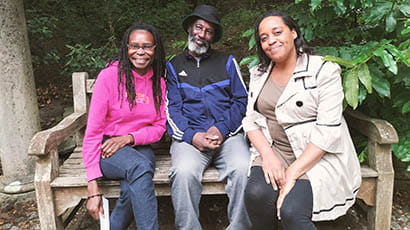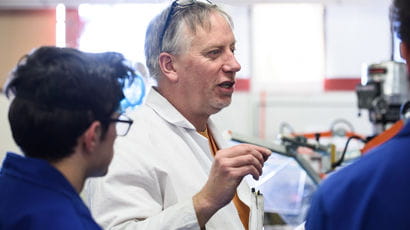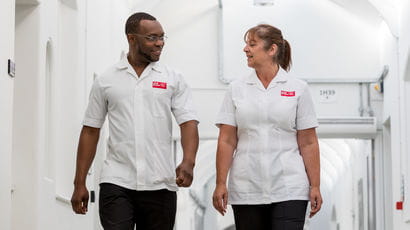New research to support a thriving health and care workforce is launched

A national research partnership will explore ways to support wellbeing and sustainability in the NHS and social care same day and urgent care workforce.
Funded by the National Institute for Health and Care Research and led by UWE Bristol, the partnership will investigate the root causes of frequent staff shortages, high employee sickness rates and difficulties recruiting new staff with a view to finding solutions.
Same day and urgent care covers general practice, ambulance services, urgent treatment centres and Emergency Departments across the UK.
Researchers will explore how to plan and provide services to ensure they meet the needs of patients and carers while offering an attractive environment for staff. The research evidence will be used to change policy and practice across the urgent care system and create an effective, thriving, diverse and sustainable workforce.
During the five-year study, academics will consult widely with patients, health and social care staff and NHS managers. They will explore contemporary issues affecting workforce recruitment and retention, particularly issues that affect staff from under-represented groups in the UK. They will map services being provided nationally and bring together existing evidence.
The Same Day and Urgent Care (SURGE) Workforce Research Partnership, which starts this month, has been funded by a grant of almost £5 million from the National Institute for Health and Care Research.
Sarah Voss, Professor of Emergency Care at UWE Bristol and co-lead on the partnership, said: “Same day and urgent care is time-critical, high-pressured and unpredictable, making the workforce extremely vulnerable to poor mental and physical health. This impacts on wellbeing, sickness levels, job satisfaction and ultimately performance. Recruitment and retention are among the worst in the NHS, resulting in challenges to the delivery of timely, safe, high-quality and efficient care for patients.”
Nicola Walsh, Professor of Knowledge Mobilisation and Musculoskeletal Health at UWE Bristol and fellow partnership co-lead, added: “For this vitally important project, we will be working closely with partners from higher education and the NHS to come up with impactful, rapidly transferable evidence that will support employers to create a more robust and thriving workforce.”
Examples of questions the researchers may ask as part of the study include: how can career development opportunities be improved to be more inclusive and encourage staff to stay working for the NHS; can different skill mixes of staff result in improved job satisfaction and efficient care for patients; and which organisational level changes might be effective in attracting new staff to work in same day and urgent care?
Possible solutions for the urgent care workforce may include more use of technology, changing the organisation and delivery of same day and urgent care services and providing alternative support mechanisms for particular groups of staff.
UWE Bristol is working on the partnership with eight other universities (Cardiff University, London School of Economics and Political Science (Care Policy and Evaluation Centre), Kingston University London, University of Bath, University of Bradford, University of Bristol, University of Lincoln, University of Surrey) and two NHS trusts (Avon and Wiltshire Mental Health Partnership NHS Trust and South Western Ambulance Service NHS Foundation Trust).
Professor Udy Archibong, Pro Vice-Chancellor for Equality, Diversity and Inclusion at the University of Bradford, said: “Inclusivity is central to the mission of this workforce research partnership. We will work with a diverse group of NHS and social care staff to identify critical equality challenges affecting recruitment and retention of the workforce. Furthermore, addressing these challenges creates opportunities to reduce systemic health and care inequalities, helping to improve patient outcomes.”
NHS Bristol, North Somerset and South Gloucestershire Integrated Care Board (BNSSG ICB) is the host organisation for the grant award and a member of the partnership’s national Study Steering Committee.
Chief People Officer at BNSSG ICB, Jo Hicks, said: “We're delighted to be working with UWE and partners on this prestigious and important national research partnership.
“Recruiting, retaining and supporting a skilled, diverse and healthy workforce is critical if we are to provide high quality and sustainable same day and urgent care services that meet our population's needs.”
The SURGE partnership is one of five designed to tackle major challenges facing NHS and social care staff as part of a £24 million investment from the National Institute for Health and Care Research. The partnerships involve 24 universities across England and Wales, five NHS trusts, four councils, and five charities and non-profit organisations, working across a wide range of integrated care system regions.
The four other partnerships are:
Allied Health Professions Workforce Research Partnership: supporting a sustainable and effective Allied Health Professions workforce in rural and coastal regions and in deprived urban areas
Prof Julie Nightingale, Sheffield Hallam University
Staff Wellbeing: Innovative partnerships to enable staff to care well under pressure and thrive at work
Prof Cath Taylor and Prof Jill Maben, University of Surrey
Social Care Workforce Research Partnership: Care Work
Prof Ann-Marie Towers, King’s College London, and Prof Karen Spilsbury, University of Leeds
Partnership for Workforce Sustainability in Underserved Areas
Prof Gillian Vance and Dr Bryan Burford, Newcastle University
Related news

28 February 2025
Paramedics in GP surgeries may ease workload but not NHS costs, study finds
Paramedics working in GP surgeries help reduce GP workload but do not contribute to cost savings to the NHS, according to the first major study of the clinical and cost-effectiveness of paramedic compared with GP consultations.

19 December 2024
UWE Bristol academic appointed honorary professor at prestigious Danish university
A UWE Bristol researcher has been appointed an honorary professor at a prestigious university in Denmark.

01 February 2024
Health services respond with changes after research reveals chance to improve temperature checks in prehospital births
Emergency services call handlers and paramedics have improved their working practices in response to findings from UWE Bristol research into out-of-hospital births.

11 September 2023
UWE Bristol experts win funding for project looking at inequalities faced by black people living with after-effects of stroke
UWE Bristol will explore how health inequalities faced by black people in the UK living with the after-effects of a stroke can be addressed.

15 May 2023
UWE Bristol researcher awarded fellowship by Royal College of Nursing
A UWE Bristol researcher, Nikki Cotterill, has received a fellowship at the Royal College of Nurse's annual congress awards ceremony.

28 February 2023
Rheumatology patients shielding during pandemic struggling with return to normal life, research reveals
Rheumatology patients who shielded during the pandemic are finding it difficult to return to normal life following the lifting of restrictions, academics at UWE Bristol have found.

09 October 2020
New emergency care research hub for Bristol launched
UWE Bristol and the University of Bristol have joined forces with healthcare partners to set up Research in Emergency Care, Avon Collaborative Hub (REACH).
You may also be interested in

Media enquiries
Enquiries related to news releases and press and contacts for the media team.

Find an expert
Media contacts are invited to check out the vast range of subjects where UWE Bristol can offer up expert commentary.

School of Health and Social Wellbeing
The School of Health and Social Wellbeing is home to all our courses and research related to this varied and rewarding sector.






